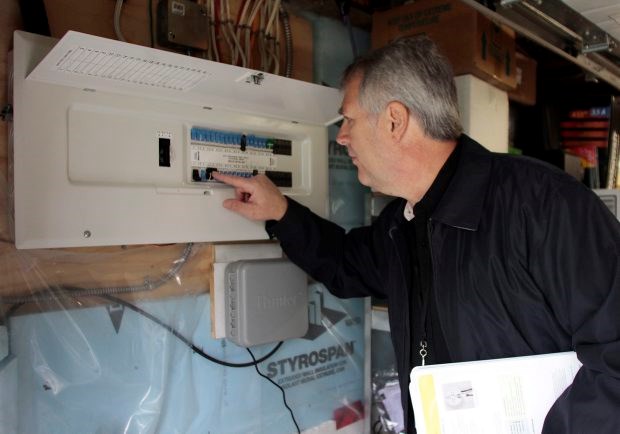Although owners of electric cars can turn their noses up at gas stations forever, they still have to find a way to "fuel" their ride. Typically that means installing a charging station, sometimes called an EVSE (Electric Vehicle Supply Equipment) at home in the garage.
To determine if your home can support an in-home, 220 volt, Level 2 EVSE charger, the manufacturer will make you go through the following steps:
Self-assessment
You are invited to do a self-assessment, drawing out a diagram of where the charger is going to be installed. This can be done on a web page on the Internet.
Site Inspection
The charging system manufacturer will schedule a site inspection. A qualified electrician will come and do a thorough evaluation of what equipment you have and whether it is capable of supporting an electric car.
Quote
Once the company is satisfied that your electrical service has the capacity, it will email a quote to you. Should you deem it acceptable, the company sets up an appointment to have the equipment installed.
Notes:
- All EVSEs follow the same electrical standard. They are all compatible with the vehicles on the road today.
- Although a 220-volt, 30-amp Level 2 EVSE charger is recommended, but is not mandatory.
- The car manufacturer only sells the electric car. The EVSE charging station is supplied by a manufacturer of the equipment.
- The car manufacturer typically recommends one or two charging partners, but the consumer is free to purchase the equipment of a third party.
- Nissan can include the purchase of the charger as part of the financing or leasing of the Leaf.
My advice is to shop around if you decide to install a Level 2 EVSE. In my case, I saved $800.
I got a site assessment and quote from AeroVironment. I then compared their unit with features and prices for models offered by six other manufacturers.
I ended up choosing a charging station from Schneider, an independent EVSE supplier not affiliated with any manufacturer. I sourced the unit from Eecol Electric, an electrical supply company. An electrician can also purchase it on your behalf.
The price difference between the two EVSE units was $100. The cost of the AeroVironment unit was $1,200 and the Schneider unit was $1,100. Keep in mind the unit I chose is an indoor-only model. The AeroVironment was a model that could be mounted indoors or out. But if you are going to mount your unit in a garage, you may consider saving yourself $100 with the indoor unit.
I then got a quote for labour to install the EVSE from a reputable local electrical contractor. The difference in quotes was staggering. My quote from AeroVironment was for $780. I eventually had the work performed by Bernie Osborne Electric for $80.
Remember to factor in the cost of necessary electrical permits in your municipality and applicable taxes toward your total cost as well.
Keep in mind a Level 2 charger is not mandatory. If you drive only 20 to 30 kilometres a day and you can top up your batteries at work, a Level 1 charger is all you might need.
In ÎÚÑ»´«Ã½, purchasers of electric cars are eligible for a $500 mail-in rebate on the cost of residential chargers from LiveSmart BC. Check the website livesmartbc.ca for a full list of eligible units. [email protected]
Follow us on our microsite at timescolonist.com/pluggedin Follow me on Twitter: @pedrothecarguy



